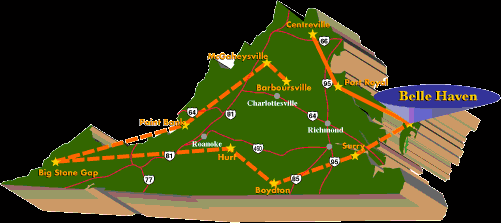
Download
in PDF Format
Like
most towns, Belle Haven�s story begins alongside a main artery of
travel. In this instance, an old stagecoach road on Virginia�s Eastern
Shore.
|
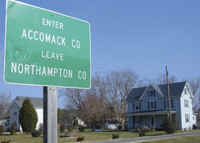
Belle
Haven is divided by a county line that puts part of the town in
Accomack County and the other part in Northampton County. A road
sign, on Belle Haven Road, marks the spot. |
A 1929 University of Virginia Extension
report states that the town was first settled in the early eighteenth
century by a fellow named Bell. Bell not only built the first residence in
town, but also a large outdoor oven in which he baked pies and cakes that
he sold to travelers. They called the place Bell�s Oven.
Later, steamboats began to transport
passengers, potatoes and produce as well as merchandise back and forth
from Baltimore to the Shore. Miles Wharf and Rue�s Wharf, only a few
miles from Belle Haven, became busy ports.
The Eastern Shore�s railroad, with a
station at Belle Haven, was built in 1884. The stagecoach, steamboat and
especially the railroad served Belle Haven well, since the town was a
convenient stop-off point for both land and sea transportation. The town,
incorporated in 1898, grew into a bustling center of commerce.
Churches, however, did not find Belle
Haven fertile soil. Kirk Mariner, in his book Revival�s Children, which
documents the Shore�s religious history, writes that by the 1870s, the
Baptists, Episcopalians, Methodists, and Universalists had all seen their
attempts to establish and maintain a church there fail.
|

A
Frank Lloyd Wright-style building, the late Dr. Wayne Mears'
medical office was used as a Head Start facility for many years
until it was recently sold. The building is currently being
renovated and will house a beauty salon. |
The Methodists had an especially tough
go of it. Their preachers were �jeered at and insulted,� writes
Mariner. One preacher delivering a sermon in Belle Haven found himself in
competition with a �heated card game� taking place at the tavern next
door.
�The community went down in the
Methodist annals of the time as perhaps the most ungodly place on the
Shore,� writes Mariner.
Today, two churches on Belle Haven Road,
once the old stagecoach road, stand as a testament to divine perseverance.
|
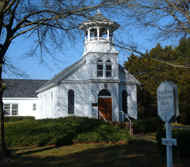
The
Belle Haven Presbyterian Church was founded in 1879. |
The Belle Haven Presbyterian Church was
formed in May of 1879. Belle Haven United Methodist Church came into being
seven years later.
By 1910, a bank had opened in Belle
Haven and, two years later, one of the town�s most impressive homes was
built by Dr. Sydney Kellam. Tom and Jan Noonan are only the second family
to reside in Raven Hall, a 9,000-square-foot Georgian-style brick mansion.
�I visited this house when I was about
10 years old,� says Tom Noonan, �when my grandparents boarded their
dog here while they made a round-the-world trip around 1957.�
|
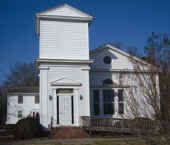
The
Belle Haven United Methodist Church followed seven years later.
Methodist clergy were not well received in Belle Haven until the
late 1800s when a church finally took root. In fact, some
Methodists considered Bell Haven one of the most
"ungodly" places on the Shore. |
When the house went on the market
several years ago, Noonan decided to move his family into town after
living many years in a waterfront home. The
beauty of the house, with its three-level staircase as well as its
history, intrigued the Noonans. The house was built by architect John
Kevan Peebles. In 1904, Peebles was chosen not only to design and build
the legislative wings of Virginia�s Capitol building in Richmond, but
also to renovate the original structure. Peebles� selection was high
praise for his talents, as the Capitol building was designed by Thomas
Jefferson.
By 1925, Belle Haven was celebrating its
heyday.
According to William J. Rue�s memoir,
Things I Remember, Belle Haven boasted 34 businesses, including �five
general stores, a furniture store, theatre, telephone exchange, two
restaurants, two millinery shops, an automobile dealer, two morticians,
and a coffin shop.� There were also �three doctors, a dentist and two
bootleggers.�
Even then, change was already in the
air.
The automobile, the subsequent
construction of Route 13 from 1923-31, and the Depression would begin the
decline of many of the Shore�s business districts. Over time, traffic
was diverted out of towns by the highway and then, by sheer necessity,
businesses followed.
While Belle Haven�s population has
remained fairly steady over the ensuing years, settling in at about 500,
most all of the businesses listed by Rue no longer exist. The Idle Hour
movie theatre is an exception.
The first Idle Hour Theatre opened its
doors on July 20, 1920; a 350-seat building premiering silent movies
accompanied by a pianist.
The price of the movie was typically 10
cents a person. Troublemakers, however, were sometimes charged more. �Wise
(Smith) would look you over pretty carefully and you didn�t fool him for
long before the price went up to 25 cents,� writes Rue about the theatre�s
owner.
|
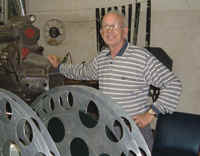
Bobby
Pase, owner of the theatre still uses the 1948 Brenkert
projectors, which he converted to handle more modern films. |
When a new home for the theatre was
constructed next door around 1948, not a frame was skipped. The old
theatre closed its doors one day and the new Idle Hour was open for
business the next, says 74-year-old Bobby Pase, who bought the theatre in
1964.
The Idle Hour was not so lucky in the
late 1950s, when then-owner Burleigh Mears was forced to close the
theatre, a casualty of television.
Pase had worked for Mears as a young boy
plastering up movie posters in local storefronts and he saw the theatre as
a safe place for young people to congregate on the weekends.
His first night, Pase was showing The
Seventh Voyage of Sinbad at 50 cents a ticket,
|
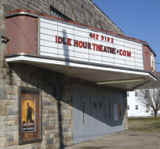
The
current Idle Hour Theatre building was constructed around 1948,
next door to the original 350-seat movie theater. |
when the electricity went out. �I
had to give everyone free passes,� Pase remembered.
Now, his daughter Beth and two
grandchildren, Rebecca and Zachary, help Pase run the theatre on weekends.
The original 1948 Brenkert projectors, which were updated to accommodate
new films, are still used and cherry and vanilla Cokes are still served at
the old Phoenix Soda Fountain.
|
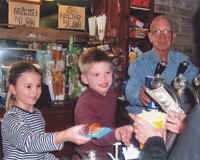
Pase's
grandchildren, Rebecca and Zachary, now help run the theatre by
manning the concession stand and helping to load films. |
Down and across the street sits the old
bank building. The bank closed during the Depression in the 1930s and was
resurrected 20 years later as an insurance company by Walter McCaleb.
His son, Phil, now runs McCaleb-Metzler
Insurance Inc. with his business partner Grey Metzler.
During a renovation in the 1950s, the
old bank ledgers, which document over 20 years of monetary exchange in the
town, were discovered over the vault.
An addition to the bank building in 1988
saw a conversion of the same vault into a bathroom with walls four bricks
deep and reinforced with railroad ties.
�It�s the place to be when a
hurricane hits Belle Haven or an atomic bomb drops on Exmore,� says Phil
McCaleb.
In half a century, McCaleb has seen the
town�s economic vitality wane and its population slightly decline and
then pick up as outsiders moved in. �It�s still small enough so you
speak to everyone you know at the post office, but I�d say half the
people in town are not from the Eastern Shore,� says McCaleb.
In the 1980s, two of those �come heres,�
a retired actor named Allen Derrick and his wife Dorothea, formed an
acting troupe called Eastern Shore�s Own, or ESO. Needing a place to
rehearse, the troupe asked the town of Belle Haven to rent them the
long-idle and much-neglected three-story brick school.
According to Rue�s memoir, the town
had been holding public school since 1875 in just about �any place
people could find to meet with a teacher.�
�February 12, 1924 was a red-letter
day in Belle Haven,� writes Rue. �Immediately, the school became the
center for most of the constructive forces in Belle Haven.�
The town school was short-lived,
however. Five years later, the Pungoteague district consolidated schools
and the Belle Haven building became a district grammar school. When Belle
Haven lost its town school, Rue believed the town lost its �rallying
point� and its �togetherness.� He wrote, �So much for progress.
Too bad for Belle Haven.�
The Town Council saw ESO as a great
remedy for the vacant school and, in 1984, rented the building to them for
a dollar a year. In 21 years, the rent has never been raised.
ESO became an incorporated arts center
in 1986 and well-known local artists began offering a medley of classes
ranging from pottery to painting to sculpture.
|
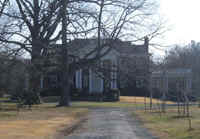
Raven
Hall, now owned by Tom and Jan Noonan, was built and designed in
1912 by John Kevan Peebles, who also restored and renovated
Virginia's Capitol Building in Richmond. |
Ballet and dance were first offered in
1989 and, with state grants, the upstairs floor of the three-story school
was renovated into a ballet studio. Under the direction of instructor Dana
Floyd, ballet has become an ESO mainstay.
�It used to be dance carried the whole
thing,� says Jane Berge, who is now co-director of ESO with Sara Stuart.
�Now with the combination of everything else, it has balanced out.
Still, dance is the biggest offering we have.�
This December, over 150 children danced
in the center�s 14th annual production of The Nutcracker.
Music instruction in piano and guitar is
becoming more popular and a summer camp for children entitled �ESO Art
(With a Little Bit of Science) Camp� is well attended.
By Town Constable Herb Tom�s
admission, ESO is one of the gems of Belle Haven and just another great
reason to live there.
|
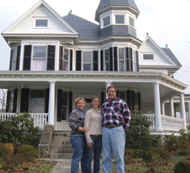
Mayor
Hal Floyd, his daughter Bethany and wife Cindy stand in front of
their 1890s Victorian, which had been divided into two apartments
before the Floyds purchased it. Hal's mother and father had lived
briefly in one of the apartments when Hal was a baby. |
Hal Floyd, who is the
town mayor and Tom�s good friend, agrees. With their two teenage
daughters, Hal and his wife Cindy have lived in Belle Haven in a grand
1890s turreted Victorian home for almost a decade and a half. Both his
daughters are talented dancers due to their training at ESO.
�This town is a
good place for kids to grow up and people to live,� says 44-year-old Hal
Floyd. �And we try to keep it that way.� Belle Haven has never
collected personal property taxes and doesn�t plan to do so in the
future. On Halloween, Floyd and Tom patrol the streets to keep the
tricking to a minimum and the treating to a maximum. And community-wide
cleanups in the spring and the fall are neighborly affairs.
�We
all have garage sales together,� says Cindy. �We all meet at the post
office. People will call you when your dog gets out. Belle Haven�s fun
and it�s safe.�